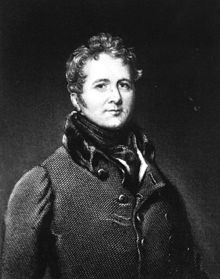|
William Knighton
Sir William Knighton, 1st Baronet, GCH (1776 – 11 October 1836) was Private Secretary to the Sovereign under George IV (1822–1830). LifeHe was born in 1776 at Bere Ferrers in Devon,[1] and studied under his uncle, Dr. Bredall, in Tavistock, Devon. He spent two years at Guy's Hospital, London, and received a diploma from the University of St Andrews in 1797. In that year he was assistant surgeon at the Royal Naval Hospital Plymouth, and then commenced private practice, initially in Devonport, in London from 1803 then briefly Edinburgh, then in London again from 1806. He was medical officer to the embassy to Spain in 1809. He retired from private practice in 1822. Knighton studied at the University of Edinburgh for three years. He received MDs from the University of Aberdeen in 1806, from the Archbishop of Canterbury, and from the University of Göttingen in 1821. He was physician to the Prince of Wales in 1810. He was also auditor of the Duchy of Lancaster, and from 1821 to 1830 was unofficially private secretary to the king and formally Keeper of the Privy Purse. In an almost unprecedented move, the king surrendered control of his financial affairs to Knighton in 1822, on account of his enormous debts. After three years, in 1825, Knighton declared that the king was free of debt. He had an unparalleled influence over the king, and letters from him to Knighton were addressed "M[y] D[ear] F[riend]," unlike the normal third person that was associated with the sovereign. He was created a baronet on 1 January 1813.[2] He died on 11 October 1836 at Stratford Place in London. He is buried in Kensal Green Cemetery. FamilyIn 1800 he married Dorothea Hawker. References
Further reading
|
||||||||||||||||||||||||||||||
